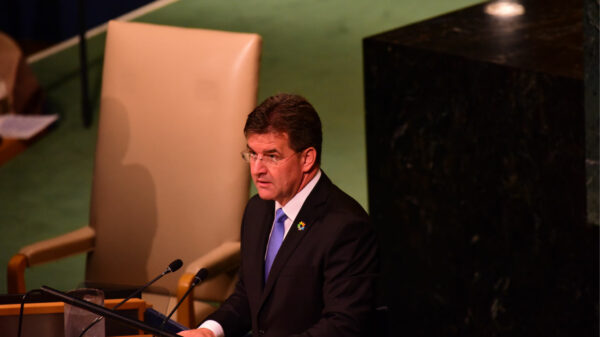In 2013, Serbia and Kosovo reached the First Agreement on Principles Governing Normalization of Relations (Brussels Agreement). The central point of the agreement was the establishment of an Association/Community of Serb Majority Municipalities (ASM) which would give more powers to local Serbs on issues pertaining to healthcare, education, urban planning and other related areas.
This was a result of the so-called “constructive ambiguity” a policy by the EU at the time, providing two options (Association/Community) for parties in the dialogue, with the aim of facilitating easier integration of Serbs and Serbian institutions in the political system of Kosovo. Since then, however, the gap between the two sides has been widening, with each side insisting on one of the options.
Over the years, the Serbian leadership has favored the term Community (Serbian: Zajednica), while the Kosovar leadership has preferred the term Association. In both everyday communication and official documents, Serbia insists on Community (Serbian Zajednica), while Pristina uses Association. The distinction is not merely terminological; it reflects deeper underlying meanings.
Association vs. Community: Terminological Differences
In English, Albanian, and Serbian, the term Community typically refers to a broad group of people with shared characteristics or circumstances, such as the community of 7th graders in a school or the community of doctors.
On the other hand, the term “Association” carries a more formal or organizational meaning. For example, while the “community of journalists” can refer to an informal group, the “Association of Journalists” denotes a structured, recognized and often registered entity with defined roles and responsibilities.
Considering these distinctions, when referring to the Association/Community of Serb-Majority Municipalities (ASM), the term Association more accurately reflects a legal and organizational framework, rather than the broader, informal meaning of Community.
However, upon closer examination, it becomes evident that the preference for using one term over the other is not based on literal meanings but rather on political considerations.
Belgrade prefers the “Community of Serb-Majority Municipalities”
The term Community (Serbian Zajednica) can be interpreted as a “union” in the Serbian language, referring to a union of municipalities that come together and delegate their competencies to the Community administration (e.g.: President, Council, Assembly).
Moreover, the Serbian leadership insists on the term Community, because it finds its basis in the Assembly of Community of Serb Municipalities of the Autonomous Province of Kosovo and Metohija – a body established by Serb members of local assemblies of 26 municipalities across Kosovo in 2008 following the unilateral Declaration of Independence of Kosovo.
The Assembly of Community existed until the 2013 Brussels Agreement when it was dismantled. Belgrade often refers to the Community of Serb Municipalities as a continuation of that Assembly.
Stemming from this Assembly of Community comes the shortened name often used in Belgrade and Serbian circles – Community of Serb Municipalities. This is an attempt by Belgrade to present the ASM as a natural extension of the Assembly of Community, which deviates even from the 2013 Brussels Agreement.
Pristina insists on the “Association of Serb-Majority Municipalities”
Different governments in Kosovo in the past ten years have insisted on using the term Association when referring to the Association/Community of Serb-Majority Municipalities (ASM). This preference stems from the fact that the term Associationaligns more with the concept of inter-municipal cooperation rather than territorial autonomy, which the term Community might imply.
Another key aspect of this distinction is that the Association can be understood very closely as a nonprofit or non-governmental organization focused on cultural cooperation, rather than the transfer of municipal powers to another layer of governance.
Furthermore, the Association has been a subject of intense political clashes between various political parties in Kosovo. The ruling party of Kosovo, the Self-Determination Movement (Levizja Vetevendosje), which was in opposition at the time, organized a series of protests that escalated with violence.
The Self-Determination Movement rose to power with the slogan “Zajednica nuk kalon” (Zajednica shall not pass), deliberately using the Serbian term “Zajednica” (instead of Association) to provoke nationalistic sentiments and instill fear among the population. By choosing this term, they aimed to equate Zajednica with the idea of a “new Republika Srpska in Kosovo.”
This shift reflects an attempt to distance the public from the emotionally charged term “Zajednica” they previously exploited, replacing it with a less provocative alternative that suits their current political narrative.
The Prime Minister of Kosovo, Albin Kurti, has now agreed to implement a degree of self-management for Kosovo Serbs under the Ohrid Agreement, adding further complexity to the ongoing debate surrounding terminology over the ASM.
From “Association/Community” to “Self-management”
When the Association/Community of Serb-Majority Municipalities, (ASM) was introduced in the 2013 Brussels Agreement, both terms—Association and Community—were used interchangeably. This indicated that the EU, as a facilitator, was offering two options for the parties in the dialogue. However, regardless of the terminology used by parties, the ASM remains unimplemented.
Ten years after the Brussels Agreement, Kosovo and Serbia reached the Agreement on the Path to Normalization Between Kosovo and Serbia (Ohrid Agreement). While the agreement avoids explicit references to the “Association” or “Community,” it introduces the concept of "self-management" for local Serbs in Kosovo, adding further complexity to the situation.
The debate over the terms Community and Association is more than just a matter of terminology; it is a disagreement over the extent of autonomy or self-management the Kosovo Serb community will have under this arrangement. The EU’s role in the dialogue should therefore be to resolve this issue, not to make it more complicated.
Regardless of the terminology used, the ASM remains unimplemented, and Serbs in Kosovo have been waiting for over a decade for Pristina to fulfill its commitment to establish it, as outlined in the 2013, 2015 and 2023 agreements.



























































